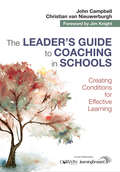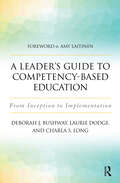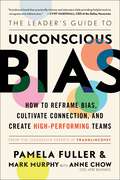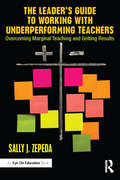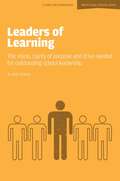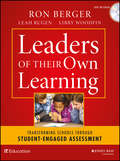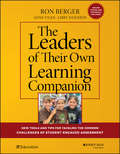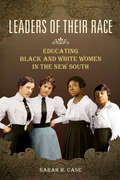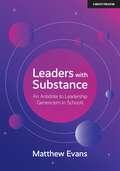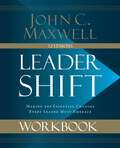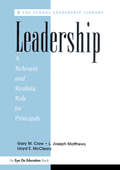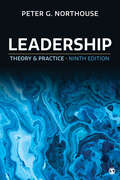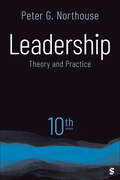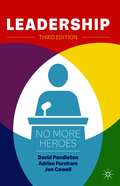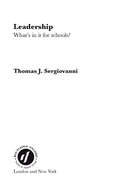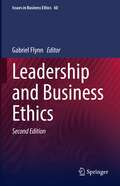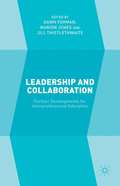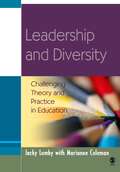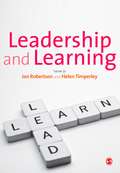- Table View
- List View
The Leader's Guide to Coaching in Schools: Creating Conditions for Effective Learning
by John Campbell Dr Christian Van NieuwerburghGrow your leadership skills to bring out the best in your school! Help your staff get “unstuck” no matter what challenges they are facing through solutions-focused coaching techniques that help them envision desired outcomes and the actions needed to achieve them. Through video examples and tools, this step-by-step guide shows you how to: Introduce a coaching approach into a wide range of conversational contexts Use the GROWTH coaching conversation framework to improve both staff and student success and well-being Use coaching approaches in areas that school leaders typically find challenging: in formal performance reviews, when giving informal feedback, and when working with teams
The Leader's Guide to Coaching in Schools: Creating Conditions for Effective Learning
by John Campbell Dr Christian Van NieuwerburghGrow your leadership skills to bring out the best in your school! Help your staff get “unstuck” no matter what challenges they are facing through solutions-focused coaching techniques that help them envision desired outcomes and the actions needed to achieve them. Through video examples and tools, this step-by-step guide shows you how to: Introduce a coaching approach into a wide range of conversational contexts Use the GROWTH coaching conversation framework to improve both staff and student success and well-being Use coaching approaches in areas that school leaders typically find challenging: in formal performance reviews, when giving informal feedback, and when working with teams
A Leader's Guide to Competency-Based Education: From Inception to Implementation
by Laurie Dodge Deborah J. Bushway Charla S. LongAs interest in competency-based education (CBE) continues to grow by leaps and bounds, the need for a practical resource to guide development of high-quality CBE programs led the authors to write this book. Until now, there has been no how-to manual that captures in one place a big picture view of CBE along with the down-to-earth means for building a CBE program.A variety of pressures are driving the growth in CBE, including the need for alternatives to the current model of higher education (with its dismal completion rates); the potential to better manage the iron triangle of costs, access, and quality; the need for graduates to be better prepared for the workforce; and the demands of adult learners for programs with the flexible time and personalized learning that CBE offers.Designed to help institutional leaders become more competent in designing, building, and scaling high-quality competency-based education (CBE) programs, this book provides context, guidelines, and process. The process is based on ten design elements that emerged from research funded by the Gates Foundation, and sponsored by AAC&U, ACE, EDUCAUSE, and the Competency-Based Education Network (C-BEN), with thought partners CAEL and Quality Matters. In short, the book will serve administrators, higher education leaders, faculty, staff, and others who have an interest in CBE by:• Giving context to enable the audience to discover the importance of each design element and to help frame the CBE program (the “why”);• Providing models, checklists, and considerations to determine the “what” component for each design element;• Sharing outlines and templates for the design elements to enable institutions to build quality, relevant, and rigorous CBE programs (the “how”).
The Leader's Guide to Unconscious Bias: How To Reframe Bias, Cultivate Connection, and Create High-Performing Teams
by Mark Murphy Pamela FullerA timely, must-have guide to understanding and overcoming bias in the workplace, from the experts at FranklinCovey. Unconscious bias affects everyone. It can look like the disappointment of an HR professional when a candidate for a new position asks about maternity leave. It can look like preferring the application of an Ivy League graduate over one from a state school. It can look like assuming a man is more entitled to speak in a meeting than his female junior colleague. Ideal for every manager who wants to understand and move past their own preconceived ideas, The Leader&’s Guide to Unconscious Bias explains that bias is the result of mental shortcuts, our likes and dislikes, and is a natural part of the human condition. And what we assume about each other and how we interact with one another has vast effects on our organizational success—especially in the workplace. Teaching you how to overcome unconscious bias, this book provides more than thirty unique tools, such as a prep worksheet and a list of ways to reframe your unconscious thoughts. According to the experts at FranklinCovey, your workplace can achieve its highest performance rate once you start to overcome your biases and allow your employees to be whole people. By recognizing bias, emphasizing empathy and curiosity, and making true understanding a priority in the workplace, we can unlock the potential of every person we encounter.
The Leader's Guide to Working with Underperforming Teachers: Overcoming Marginal Teaching and Getting Results
by Sally J ZepedaUnder increasing pressure in the face of teacher evaluation systems and accountability measures, schools must focus on those teachers that exhibit marginal to incompetent teaching behaviors in their classrooms. This book is a vital resource for educational leaders who are responsible for instructional programs and teacher evaluation. Zepeda’s tried-and-true strategies will help you take the necessary steps to support and mentor struggling teachers by detecting underperformance, developing strategies to help teachers, engaging in difficult conversations to enact plans of improvement, and following legal requirements. The practical tools found in this book will help teachers improve their instruction, assessment, classroom management, and teamwork.
The Leader's Guide to Working with Underperforming Teachers: Overcoming Marginal Teaching and Getting Results
by Sally J ZepedaUnder increasing pressure in the face of teacher evaluation systems and accountability measures, schools must focus on those teachers that exhibit marginal to incompetent teaching behaviors in their classrooms. This book is a vital resource for educational leaders who are responsible for instructional programs and teacher evaluation. Zepeda’s tried-and-true strategies will help you take the necessary steps to support and mentor struggling teachers by detecting underperformance, developing strategies to help teachers, engaging in difficult conversations to enact plans of improvement, and following legal requirements. The practical tools found in this book will help teachers improve their instruction, assessment, classroom management, and teamwork.
Leaders of Learning: The Vision, Clarity Of Purpose And Drive Needed For Outstanding School Leadership (World Class Schools Ser.)
by Rob StokoeRob Stokoe, director at Jumeirah English Speaking Schools in Dubai, explores the ever-changing demands and requirements for leadership in education and leaders of learning: 'We now know so much more about how we learn, how our brains function and grow. Our collaborative networks are growing exponentially; educators are now globally connected. Furthermore there is a growing awareness and a deeper understanding emerging, a convergence of ideas, new and old, which are informing the educational debate. 'We have a job to do, to make informed, considered decisions, to be flexible and pro active, take risks in order to structure and define ways of learning and inquiry-based education which will best meet the needs of students who are the greatest resource humanity has. Our goal is simply to determine a meaningful and purposeful future for each and every student globally.'
Leaders of Learning: The Vision, Clarity Of Purpose And Drive Needed For Outstanding School Leadership (World Class Schools Ser.)
by Rob StokoeRob Stokoe, director at Jumeirah English Speaking Schools in Dubai, explores the ever-changing demands and requirements for leadership in education and leaders of learning: 'We now know so much more about how we learn, how our brains function and grow. Our collaborative networks are growing exponentially; educators are now globally connected. Furthermore there is a growing awareness and a deeper understanding emerging, a convergence of ideas, new and old, which are informing the educational debate. 'We have a job to do, to make informed, considered decisions, to be flexible and pro active, take risks in order to structure and define ways of learning and inquiry-based education which will best meet the needs of students who are the greatest resource humanity has. Our goal is simply to determine a meaningful and purposeful future for each and every student globally.'
Leaders of Their Own Learning: Transforming Schools Through Student-Engaged Assessment
by Leah Rugen Ron Berger Libby Woodfin Expeditionary LearningFrom Expeditionary Learning Schools comes a proven approach to student assessmentLeaders of Their Own Learning offers a new way of thinking about assessment based on the celebrated work of Expeditionary Learning Schools across the country. Student-Engaged Assessment is not a single practice but an approach to teaching and learning that equips and compels students to understand goals for their learning and growth, track their progress toward those goals, and take responsibility for reaching them. This requires a set of interrelated strategies and structures and a whole-school culture in which students are given the respect and responsibility to be meaningfully engaged in their own learning.Includes everything teachers and school leaders need to implement a successful Student-Engaged Assessment system in their schoolsOutlines the practices that will engage students in making academic progress, improve achievement, and involve families and communities in the life of the schoolDescribes each of the book's eight key practices, gives advice on how to begin, and explains what teachers and school leaders need to put into practice in their own classroomsRon Berger is Chief Program Officer for Expeditionary Learning and former public school teacherLeaders of Their Own Learning shows educators how to ignite the capacity of students to take responsibility for their own learning, meet Common Core and state standards, and reach higher levels of achievement.DVD and other supplementary materials are not included as part of the e-book file, but are available for download after purchase.
The Leaders of Their Own Learning Companion: New Tools and Tips for Tackling the Common Challenges of Student-Engaged Assessment
by Ron Berger Libby Woodfin Anne VilenA New Companion to Leaders of Their Own Learning Puts Students in Charge of Their Learning and Growth Five years after the publication of Leaders of Their Own Learning, EL Education is back with a new companion guide to help you tackle the common challenges of student-engaged assessment. This unique, student-centered approach to assessment equips and compels students to understand goals for their learning and growth, track their progress toward those goals, and take responsibility for reaching them. EL Education has more than 25 years of experience supporting school transformation through student-engaged assessment. With their new book, The Leaders of Their Own Learning Companion, they have harvested the best tools and wisdom from schools across the country to help you hone student-led assessment practices in your classroom and school. Identifies the common challenges of implementing each of the eight interrelated student-engaged assessment practices from Leaders of Their Own Learning, and provides strategies and tools for tackling them Offers practical tips for school leaders Deepens your learning with 46 videos and an online toolbox The Leaders of Their Own Learning Companion is designed for teachers and leaders of all grade levels and no prior knowledge of the original Leaders of Their Own Learning is necessary to make the most of this book.
Leaders of Their Race: Educating Black and White Women in the New South (Women, Gender, and Sexuality in American History)
by Sarah H. CaseSecondary level female education played a foundational role in reshaping women's identity in the New South. Sarah H. Case examines the transformative processes involved at two Georgia schools--one in Atlanta for African-American girls and young women, the other in Athens and attended by young white women with elite backgrounds. Focusing on the period between 1880 and 1925, Case's analysis shows how race, gender, sexuality, and region worked within these institutions to shape education. Her comparative approach shines a particular light on how female education embodied the complex ways racial and gender identity functioned at the time. As she shows, the schools cultivated modesty and self-restraint to protect the students. Indeed, concerns about female sexuality and respectability united the schools despite their different student populations. Case also follows the lives of the women as adult teachers, alumnae, and activists who drew on their education to negotiate the New South's economic and social upheavals.
Leaders With Substance: An Antidote to Leadership Genericism in Schools
by Matthew EvansLeadership is an ill-defined domain, drowning in abstract theories and models of expertise. School leadership suffers from this lack of a satisfactory and useful definition of leadership, and has of late been drawn in to generic approaches to school improvement which have left the workforce feeling anything but `well led'. How do we put `substance' back in to school leadership? This book draws on the lessons of cognitive science and explores the specific things that school leaders do, arguing for a notion of school leadership rooted in the realities of leaders' daily experiences. It presents a case for how school leaders can develop their expertise and, in doing so, places domain-specific knowledge at the heart of school improvement efforts.
Leaders With Substance: An Antidote to Leadership Genericism in Schools
by Matthew EvansLeadership is an ill-defined domain, drowning in abstract theories and models of expertise. School leadership suffers from this lack of a satisfactory and useful definition of leadership, and has of late been drawn in to generic approaches to school improvement which have left the workforce feeling anything but `well led'. How do we put `substance' back in to school leadership? This book draws on the lessons of cognitive science and explores the specific things that school leaders do, arguing for a notion of school leadership rooted in the realities of leaders' daily experiences. It presents a case for how school leaders can develop their expertise and, in doing so, places domain-specific knowledge at the heart of school improvement efforts.
Leadershift Workbook: Making the Essential Changes Every Leader Must Embrace
by John C. MaxwellLead-er-shift [verb]: The act of nimbly adapting one’s leadership in the midst of rapid change.The term leadershift may be new to you, but the climate of change that demands it is not. As a leader, you already know that it takes more than staying the course to be successful. The key to not just surviving but to continual innovation, improvement, and influence is to learn how to leadershift.In the Leadershift Workbook, based on the bestselling book of the same name, author John C. Maxwell helps leaders make the changes the current fast-paced environment demands. He begins by helping leaders embrace seven principles to face every situation with flexibility and confidence:Continually learn, unlearn, and relearnValue yesterday, but live in todayRely on speed, but thrive on timingSee the big picture as the picture keeps getting biggerLive in today, but think about tomorrowMove forward courageously in the midst of uncertaintyRealize today’s best will not meet tomorrow’s challengesIn each of the lessons in this workbook, John shares the critical shifts he has personally made over the course of his long and successful leadership career, including the Adaptive Shift from Plan A to Option A, the Production Shift from Ladder Climbing to Ladder Building, and the Influence Shift from Positional Authority to Moral Authority. These leadershifts will change the way you think, act, and ultimately lead so you can be proactive and successful in an ever-changing world.Designed for use with the Leadershift book (9780718098506).
Leadership: A Relevant and Realistic Role for Principals
by Gary M. Crow Lloyd E. Mc Cleary L. Joseph MatthewsWith case studies on such topics as implementing a technology program and modifying a schedule, this book shows why principals must play a leadership role.
Leadership: Theory and Practice
by Peter G. NorthouseAdopted at more than 1,600 institutions in 89 countries and translated into 15 different languages! The market-leading Leadership: Theory and Practice by Peter G. Northouse presents an academically robust account of the major theories and models of leadership with a focus on how theory can inform practice. Northouse uses a consistent structure for each chapter that allows readers to easily compare and contrast different theories. Case studies and questionnaires provide students with practical examples and opportunities to deepen their understanding of their own leadership style. The fully updated Ninth Edition features a new chapter on inclusive leadership, 17 new real-world cases that profile leaders from across the globe, a new discussion on leadership and morality, and examples of timely issues such as leadership during the COVID-19 pandemic. This title is accompanied by a complete teaching and learning package.
Leadership: Theory and Practice
by Peter G. NorthouseAdopted at more than 1,600 institutions in 89 countries and translated into 15 different languages! The market-leading Leadership: Theory and Practice by Peter G. Northouse presents an academically robust account of the major theories and models of leadership with a focus on how theory can inform practice. Northouse uses a consistent structure for each chapter that allows readers to easily compare and contrast different theories. Case studies and questionnaires provide students with practical examples and opportunities to deepen their understanding of their own leadership style. The fully updated Ninth Edition features a new chapter on inclusive leadership, 17 new real-world cases that profile leaders from across the globe, a new discussion on leadership and morality, and examples of timely issues such as leadership during the COVID-19 pandemic. This title is accompanied by a complete teaching and learning package.
Leadership: Theory and Practice
by Peter G. NorthouseNow with a new chapter on Social Identity Leadership! Adopted in thousands of courses in 89 countries and translated into 15 different languages, this market-leading text successfully combines an academically robust account of the major theories and models of leadership with an accessible style and focus on how leadership theory can inform leadership practice. Peter G. Northouse uses a consistent structure for each chapter, allowing readers to easily compare and contrast different theories. Case studies and questionnaires provide students with practical examples and opportunities to deepen their understanding of their own leadership style.
Leadership: Theory and Practice
by Peter G. NorthouseNow with a new chapter on Social Identity Leadership! Adopted in thousands of courses in 89 countries and translated into 15 different languages, this market-leading text successfully combines an academically robust account of the major theories and models of leadership with an accessible style and focus on how leadership theory can inform leadership practice. Peter G. Northouse uses a consistent structure for each chapter, allowing readers to easily compare and contrast different theories. Case studies and questionnaires provide students with practical examples and opportunities to deepen their understanding of their own leadership style.
Leadership: No More Heroes
by David Pendleton Adrian F. Furnham Jonathan CowellLeadership is most needed in times of change, uncertainty and crisis. We are living through those times. To support leaders in all spheres, this book provides a guide to the territory of leadership and its three domains: the strategic (head), the operational (hands) and the interpersonal (heart). It describes the tasks leaders have to achieve and explains the psychology of leadership based in personality. It argues strongly that complete leadership is the province of diverse teams of leaders made up of complementary differences. And now the best has just got better. The new edition shows how leadership has to change over time, describes how the most highly rated leaders achieve their goals and also elucidates the neuroscience of leadership to enhance understanding of leadership’s foundations. Pendleton, Furnham and Cowell’s work is a powerful combination of the best research on the psychology of leadership and years of iteration and practical implementation in the field – working with thousands of leaders from all walks of life and learning from their successes and challenges. There is no one secret recipe for success as a leader. What this book provides is a framework to enable you to achieve success in your own way.
Leadership: What's In It For Schools? (What's in it for schools?)
by Tom SergiovanniThe What's in it for Schools series has been written by experts in the field for an audience of busy practitioners. The books present research and thinking about topical education issues and present it in an accessible and relevant way.What makes a good leader? Does good leadership matter in helping schools be more successful? This concise and accessible book examines leadership in a practical way by helping principals, heads, teachers and parents establish their roles and responsibilities and get to grips with the unique leadership requirements of schools.The author explores issues such as leadership, what it is and how it works, character and culture as keys to improvement, how to build commitment, motivation and improved performance, and using local standards and assessments to improve schools and leadership as a form of social capital.
Leadership and Business Ethics (Issues in Business Ethics #60)
by Gabriel FlynnThis book offers new and challenging approaches to business ethics that successfully link theory and practice thereby overcoming lacunae and inadequacies in much of the literature concerning ethics and governance, a theme that recurs with remarkable frequency in the history of business ethics as an academic discipline. This work provides imaginative and innovate proposals for the indispensable coupling of virtue, integrity, and character with global business, finance, and banking. The volume seeks to overcome the marginal status of business ethics in universities, business, and enterprise by demonstrating that virtue ethics is an important step in the direction of an adequate response to the leadership issue. This new edition of a popular work points to new ways of achieving an ever more urgent coalescence of ethics and business. It proposes practical advice and viable suggestions to business people on what is right and wrong in business. The volume makes a vital contribution in the area of education that should serve the ongoing development of top leaders. In the important domain of women in leadership, the volume provides new solutions that break boundaries on the global stage. The work challenges unethical marketing of human images with important implications for citizenship and society. The volume contains creative suggestions for the use of spirituality and human development for the enhancement of business and society. The significantly extended second edition includes an exciting line up of leading academics and practitioners in the audacious hope that something may change for the better in the realms of business and banking.
Leadership and Collaboration
by Dawn Forman Marion Jones Jill ThistlethwaiteLeadership and Collaboration provides international examples of how leadership of interprofessional education and practice has developed in various countries and examines how interprofessional education and collaborative practice can make a difference to the care of the patient, client and community. The authors showcase a variety of contexts in which interprofessional education and practice is now taking place and provide guidance for leaders to establish and maintain an environment where everyone involved in the team can 'learn with, from and about each other to improve collaboration and the quality of care".
Leadership and Diversity: Challenging Theory and Practice in Education (Education Leadership for Social Justice)
by Professor Jacky Lumby Marianne ColemanWhat do we mean by diversity? Why is it an important issue for leaders of schools, colleges and universities? As society becomes increasingly diverse, there is significant international awareness in education about how this impacts on leaders and leadership. For decades the emphasis has been placed on increasing the number of leaders with specific attributes, such as women or those from ethnic minorities, to encourage a true representation of society. This far-reaching book takes a wider view, challenging the reader to recognise the importance of diversity issues and to embed diversity as central within leadership theory and practice. Drawing on their extensive research the authors establish a clear understanding of what diversity means and use this to develop a distinct approach to conceiving leadership, preparing leaders and acting as leaders. They explain how diversity should be a holistic issue which touches every aspect of leadership and is vital to ensuring effective and appropriate leadership for education in pluralist societies. The authors explore the history of approaches to addressing inequities in access to leadership positions and the experience of leadership, from equal opportunities, to diversity and inclusion, to capabilities approaches. The book also proposes fundamental and concrete changes that leaders can undertake both in their own and their organisation's practice, to reflect a real commitment to social justice in a diverse society.
Leadership and Learning
by Jan Robertson Helen TimperleyBringing together internationally recognised scholars this book focuses on the relationship between leadership and learning for the education community. It draws together a wealth of knowledge and research in the field across a variety of contexts, such as system leadership, professional learning communities and leading different cultures. Themes covered include: - exploring models for leadership and improvement - challenges in developing learning-focused leadership - broadening ideas of learning and knowledge work. This book will be of interest to educational leaders at all levels and in all sectors, as well as consultants, academics and those who wish to extend their knowledge in educational leadership whether engaging in further academic study or in reflective practice around the ideas presented. This book is essential for anyone taking advanced programmes in educational leadership and management.
